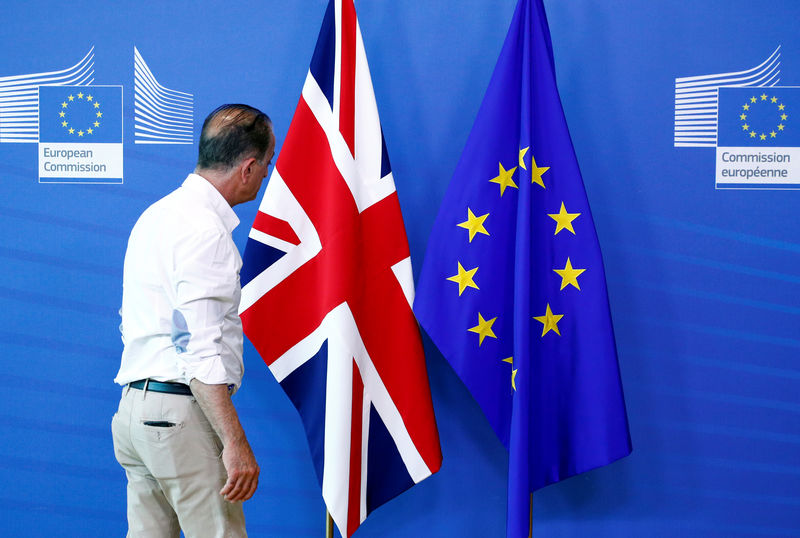By William Schomberg and Tom Miles
LONDON/GENEVA (Reuters) - The prospect of a "no-deal Brexit" appears to have grown after the European Union's negotiator rejected last month central elements of Prime Minister Theresa May's proposals for a new trade agreement.
Bank of England Governor Mark Carney said on Friday the possibility of Britain leaving the EU without striking any deal with Brussels was "uncomfortably high". Trade minister Liam Fox has put the chances at 60-40.
May's office repeated on Monday she believed Britain would negotiate a good agreement but that "no deal is better than a bad deal".
The pound hit an 11-month low against the dollar on Monday with traders linking this partly to the possibility of no deal. It rose modestly on Tuesday.
Following are some questions and answers about what a no-deal Brexit might mean.
What will happen if Britain and the EU fail to get a deal?
Britain is a member of the World Trade Organization so tariffs and other terms governing its trade with the EU would be set under WTO rules.
EU tariffs are quite low, averaging about 5 percent, but they are higher for some important British exports including cars which would face a 10 percent tariff.
Exporters could face other barriers including complying with EU standards for goods such as food and electrical products. British exports might get stuck at the EU border.
Many British services firms, especially in the giant financial industry, would probably face more restrictions on doing business in the bloc than under May's preferred deal.
Under WTO rules Britain and the EU could not offer each other low tariffs, quick border checks, or close cooperation on services, unless they offered these to all WTO member states.
What's the downside of a no-deal Brexit?
Most economists say the higher the barriers are to trade with the EU, the bigger the hit for Britain.
The National Institute for Economic and Social Research says a no-deal Brexit would cost each person in Britain 800 pounds ($1,030) a year more than the effect of a "soft Brexit" under which Britain had ties to the EU similar to Norway's. May's plan would cost 500 pounds per person a year more than a soft Brexit.
The impact on Britain's economy could be bigger still if business investment falls, aggravating slow productivity growth, or a fall in migration causes labor shortages.
What's the upside to a no-deal Brexit?
Brexit supporters argue that WTO rules would help Britain's economy by making it easier for London to strike its own trade deals with faster-growing countries and regions beyond Europe.
However, this would take years and Britain on its own might struggle to secure favorable terms from the likes of the United States and China.
Ruth Lea, a pro-Brexit economist, said the concerns about border delays were overblown, because countries outside the EU typically declare their exports online to speed their passage.
Brexit backers also say Britain could save its estimated EU divorce bill of around 39 billion pounds and spend this on public services instead.
Will a no-deal Brexit mean chaos?
With less than eight months until Britain leaves the EU, time is short to negotiate an agreement or prepare both sides for the possibility of no deal.
Any disorderly Brexit risks delays at borders as officials struggle with a sudden introduction of new customs rules.
Britain's government is drawing up plans to stockpile medicines and blood products before a possible no-deal Brexit.
In the worst-case scenario, Britain would fall out of EU arrangements such as the U.S.-EU aviation Open Skies agreement, possibly causing transport chaos. Financial derivatives trading would face legal uncertainty.
EU citizens in Britain and British citizens in the EU would risk losing residency and other rights.
Given the potential for disruption, the EU might offer to extend the Brexit negotiation period if there were some prospect of a deal, Malcolm Barr, a JP Morgan economist, said.

"The EU knows that a no-deal Brexit would hurt all involved and would be an enormously complex problem to manage," he said.